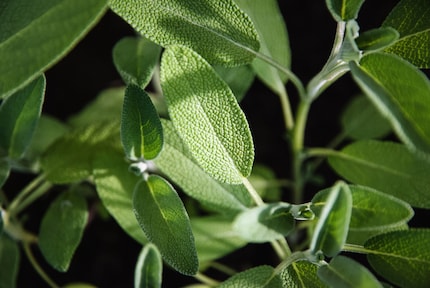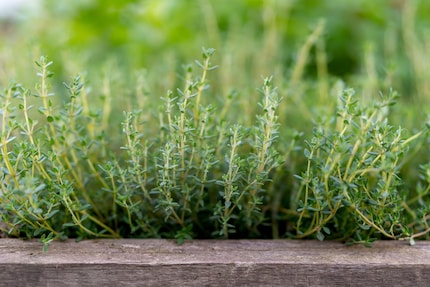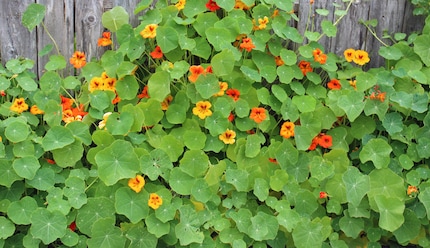
Background information
Cranberry, bladder tea, vitamins: What helps with cystitis?
by Olivia Leimpeters-Leth

Picking and adding a handful of aromatic herbs to your meals from time to time can save you a lot of money at the chemist. At least that's what doctor, author and presenter Franziska Rubin says in an interview. She also explains how herbal home remedies work and why it's often not necessary to take medication in the first place.
Aromatic herbs grow in the garden, on the balcony or windowsill. Thyme, parsley and co. not only beautify the kitchen and diversify dishes, they are also medicinal plants with miraculous effects on your health and well-being.
Dre Franziska Rubin knows this well. Before she became famous for her appearances on German television, the doctor was already working on the borderline between traditional and natural medicine.traditional and natural medicine and knows that "traditional medicine often kills a fly with a cannon, which I also use when I have a big fight on my hands. But, most of the time, gentler home remedies are enough."
In his book 10 Kräuter gegen 100 Krankheiten, the kitchen windowsill is transformed into a veritable home pharmacy, and eating is no longer just a pleasure, but also a way of preserving your health. Whether it's a urinary infection, sleep problems or migraines, medicinal herbs cure all ailments. Here's how to put them to good use.
From Hippocrates to traditional Chinese medicinethe use of medicinal plants is as old as humanity itself.
As far back as the European Middle Ages, monastic medicine under Abbess Hildegard von Bingen considered medicinal herbs as an important remedy for all kinds of illnesses. Thyme, valerian and bertram, for example, were used for coughs and colds, as noted in von Bingen's Physica.
Modern Western medicine as we know it today developed much later, around the 19th century. While pathogenesis, the study of the origin of illnesses, became the norm, it was salutogenesis that was advocated in naturopathy, i.e. the study of all the processes that promote and maintain our health.
"In traditional medicine, we combat a symptom with an active substance, whereas home remedies act in a holistic and preventive way," explains Dr Rubin. In salutogenesis, we talk about a sense of coherence: health emerges when life is full of meaning and you can take charge of your life and your health. Although this concept is not new, modern studies recommend integrating the salutogenesis approach into traditional medicine.
"The body is always trying to heal itself," says Franziska Rubin. "With home remedies, I stimulate it to take action. "But self-healing always requires an effort from your body. So if the body lacks strength, you have to resort to traditional medicine: "If my condition doesn't improve with compresses and herbal teas over a period of three days, my body needs something else, for example an antibiotic," Franziska Rubin points out.
In many cases, however, you can spare yourself medication by dipping into your herb patch and look after your health in a sustainable and natural way. Dr Rubin recommends growing herbs in your own garden or on your balcony and, above all, cooking with them: "Aromatic herbs enrich not only the vegetable garden, but also your meals."
She also advises buying herbs from garden centres, where the choice is more varied and you can find other types of plant than in the supermarket. If the effect of the moderate dosage of aromatic herbs is not enough to relieve your symptoms, there are more highly dosed herbal preparations available from pharmacies.

For many people, autumn is synonymous with colds. Instead of consuming painkillers for months on end, you can try sage.
Whether fresh or dried, a study published in the Journal of Traditional and Complementary Medicine on the therapeutic use of sage concludes that this herb has anti-inflammatory, antibacterialIt reduces free radicals and can therefore be considered as an adjunct treatment for more serious illnesses such as Alzheimer's, diabetes and cancer. As a gargle or infusion with honey, throat inflammations can be relieved in no time.
Recipe for sage gargle solution:

Already popular in Hildegard von Bingen's day, thyme is one of Franziska Rubin's favourites during the cold season: "Thyme is my favourite remedy for coughs, because it relaxes the bronchial muscles. Thyme can be used as an inhalation, an infusion or applied externally in the form of an oil."
In addition, its active substance, thymol, reduces oxidative stress and thus functions as a natural anti-ageing active ingredient: "The older we get, the more cellular damage due to oxidative stress increases," explains Dr Rubin. "Thyme has great antioxidant power, slowing down cellular ageing and preserving the regenerative capacity of cells."
In addition, thymol has an antispasmodic and analgesic effect, for example in cases of menstrual disorders, similar to the analgesic ibuprofen. That's according to a study published in the Caspian Journal of Internal Medicine.
You can use thyme both internally and externally. As an infusion, in the form of oil or incorporated into your next meal, it's not only healthy, but tasty too. For menstrual pain, you can make a natural muscle relaxant with thyme:
In the case of coughs and bronchial disorders, the poultice also acts as a compress on the chest.

For sleep disorders, restlessness and nervousness, there are also a few natural remedies such as lavender. Some studies show that lavender oil in particular soothes anxiety and sleep. Other studies claim that a highly concentrated dosage of lavender essential oil produces the same effect as Lorazepam, a drug used for anxiety disorders. The calming effect comes from the flint, but, according to expert Franziska Rubin, the linalool and linalyl acetate contained in lavender also calm brain activity.
Valerian, lemon balm, yarrow or hops also relieve restlessness and ensure a good night's sleep. Herbal tea blends or high-dose valerian and lavender capsules sold in pharmacies are recommended. In addition, you can spray lavender on your pillow or apply a lavender compress to your chest to soothe yourself before going to bed.
Lavender not only relieves sleep disorders, but also headaches. This is shown by an Iranian study: a few drops on the chest, or under the nose, are enough to relieve headaches. You can easily make this oil yourself:

Cystitis can happen to anyone and is never pleasant. As long as it isn't chronic, a parsley-based soup can help: its diuretic effect helps to eliminate the Escherichia coli bacteria responsible for the infection from the bladder.
"Parsley also contains apigenin, which has an anti-inflammatory effect," notes Dr Rubin, and its effect against cancer cells is also known. In addition, apigenin has a positive effect on intestinal health and the microbiome. Parsley also helps to process poorly digestible foods and release important nutrients from food.
For a fit bladder, you can easily make a homemade parsley tea:

Good news for garlic fans: the bulb not only enhances the taste of your food, it also works against viruses, bacteria and fungi. It's the allicin it contains that's responsible: according to studies, it has anti-cancer and anti-microbial effects and reduces cholesterol levels. "The allicin in garlic has an effect comparable to that of penicillin," explains expert Franziska Rubin. "Less powerful, of course", says the expert, but garlic's antibiotic effect is still surprising.
Nasturtium shows similar effects: "It's the mustard oils that have an antimicrobial effect here. They act not only against bacteria, but also in a non-specific way, i.e. against resistant germs."So nasturtium also works when resistant germs have developed and the traditional antibiotic has failed.
And on the subject of mustard oil: horseradish also contains it. In the event of an infection, the expert recommends a tablespoon of freshly grated horseradish with honey for a particularly high amount of mustard glycosides.
And what about mustard oil: horseradish also contains mustard glycosides.
As for garlic, it lends itself particularly well to use in cooking, but for a slightly more potent blend, Dr Rubin recommends the Lemon Garlic Drink:
"The brew lasts for several weeks. It has an antiseptic effect, reduces cholesterol and even acts as a probiotic for the intestinal flora. "In the event of an infection, you can drink a small shot every morning.
Got a taste for it and want to find out more about alternative medicine and medicinal plants? Then listen to the expert's new podcast: "Dr. Franziska Rubin - gibt's da nicht auch was Natürliches?"
Header photo: shutterstock
I'm a sucker for flowery turns of phrase and allegorical language. Clever metaphors are my Kryptonite – even if, sometimes, it's better to just get to the point. Everything I write is edited by my cat, which I reckon is more «pet humanisation» than metaphor. When I'm not at my desk, I enjoy going hiking, taking part in fireside jamming sessions, dragging my exhausted body out to do some sport and hitting the occasional party.
Interesting facts about products, behind-the-scenes looks at manufacturers and deep-dives on interesting people.
Show all
Background information
by Olivia Leimpeters-Leth

Background information
by Mareike Steger

Background information
by Anna Sandner